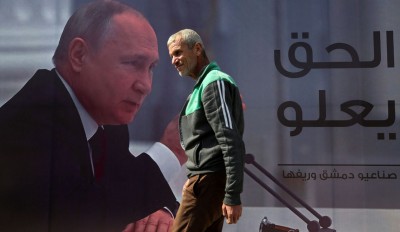- 2022-03-10 03:09:10
- LAST MODIFIED: 2026-02-15 16:43:06
New rules for a new world
Bret Stephens

A man walks past a poster depicting Russian President Vladimir Putin in Damascus, Syria, March 7, 2022. Reuters
Russia’s invasion of Ukraine is being described as the end of the post-Cold War era. This isn’t quite accurate. Since the Soviet Union collapsed in 1991, we’ve seen three different eras. Each of them lasted about a decade.
There were the End of History years of the 1990s, when Washington thought the main task of foreign policy was to usher the world into a more democratic, free-market, rules-based order. Those priorities faded after 9/11, when no international issue mattered more to policymakers than the fight against militant Islamism. A decade later, after Osama bin Laden was killed in 2011, Barack Obama effectively called an end to the war on terror, saying it was time to “focus on nation building here at home.”
This was a decade whose animating instincts were typified by two telling reactions by two presidents to two crises — both involving Ukraine.
The first was Obama’s tepid response to Russia’s 2014 seizure of Crimea, after which he refused to provide Kyiv with lethal military aid on the theory that Ukraine’s future was a core Russian interest but not an American one. The second was Donald Trump’s attempted shakedown of Volodymyr Zelensky in 2019, in which he tried to hold up security assistance to Ukraine in exchange for dirt on the Biden family.
In other words, Obama looked at Ukraine and asked, “What’s in it for us?” Trump looked at Ukraine and asked, “What’s in it for me?” For neither president was the question of staving off another Russian invasion, much less of encouraging Ukraine’s democratic development, a particular priority.
Meanwhile, Vladimir Putin looked at Ukraine and concluded: “It’s all for me.”
The Russian president may have had various motives for invading Ukraine. But it would be foolish to suppose that he wasn’t also enticed — by our seeming indifference to Ukraine’s fate; by the willingness of successive American presidents to continue to do business with him even as he invaded neighbours, poisoned dissidents, hacked our networks and meddled in our elections; by Europe’s military weakness and growing reliance on Russian energy; by the coalescing of an Axis of Autocracy bent on overthrowing the American-led liberal order.
All of this made Putin’s Ukraine gambit seem like a good bet — except for his failure to reckon with the courage of the Ukrainian people, their magnificent president, and his own military’s ineptitude. That courage has given the West time to regroup to help save Ukraine. It should also be an opportunity to rethink the way in which we look at foreign affairs for the next decade. We need new rules for a new world.
What should they be? A few ideas:
Free trade for the free world. Economic nationalism never works. De-linking the Russian economy from the rest of the world is already painful. And the only long-term hope for decoupling from China is through deeper economic integration of free and allied nations. That means the revival of the Trans-Pacific Partnership, and a free-trade agreement with the European Union and another one with Britain.
Help those who help themselves. If a lesson of the past 20 years is that we cannot fight for the freedom of those who won’t fight for it themselves, the lesson of Ukraine is that we can at least give those who will fight the tools so they can finish the job. One model is the deal for nuclear-powered submarines that the U.S. and Britain signed last year with Australia, which the administration needs to accelerate if it’s going to be a deterrent to China. Another model is Israel, which we arm with American jets so that we never need defend it with U.S. troops.
Parallel global institutions. China has trashed the World Trade Organization by refusing to meet its commitments. Russia trashed Interpol by using the agency to persecute political dissidents. The Biden administration may not want to exit those legacy organizations, but it can downgrade their relevance by investing in new or nascent organizations in which democracy buys membership.
Be honest about energy. The world will need carbon-based fuels for decades to come. And we are better off extracting more of it in North America — including on U.S. federal land — than by asking Saudi Arabia to ramp up production or hoping to get more from Venezuela and Iran with sanctions relief. The alternative to increasing domestic oil and gas production isn’t only clean alternative energy. It’s also filthy petrostate energy.
Get serious about defence. The dumbest debate in foreign-policy circles is whether China or Russia is the graver threat. The real answer is that we don’t have the luxury of choosing. But we do have the luxury of spending more on defence, which, at less than 4% of gross domestic product, is about half of what we spent in the prosperous 1980s. A 500-ship Navy — a 200 ship increase — should be a national priority.
Play to win. “Here’s my strategy on the Cold War,” Ronald Reagan once told his adviser Richard Allen: “We win, they lose.” He said that in 1977, when it seemed like a pipe dream. Twelve years later, it was a fact. Let’s aim for a world unhaunted by the likes of Vladimir Putin.
Source: The New York Times










